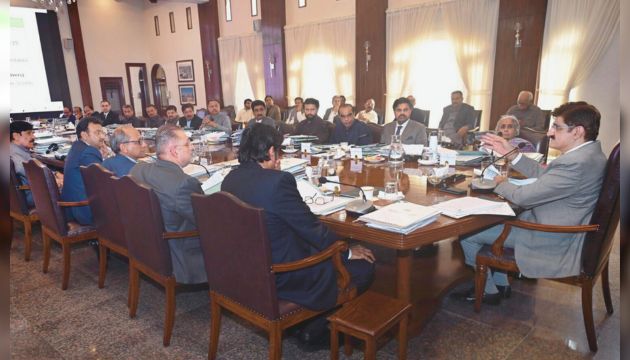KARACHI: The Sindh cabinet has decided to investigate issues in all educational boards across the province and approved extra marks for thousands of students who took the first-year exam held by the Board of Intermediate Education Karachi (BIEK) last year.
During a meeting led by the Sindh Chief Minister, the cabinet was unhappy with how the educational boards were functioning, they instructed the chief secretary to form a committee of honest officers to look into problems in all educational boards.
Many first-year students in Karachi, including those who scored 80-85 percent in their matriculation exams, received less than 50 percent in their intermediate exams, and some failed multiple subjects.
The low results from BIEK led to protests by students, political groups, and civil rights activists. This prompted the Sindh Assembly to form a special committee to examine why the pass rates dropped.
The cabinet learned that a fact-finding committee, headed by Dr. Sarosh Lodi, Vice Chancellor of NED University, conducted a thorough investigation. The committee suggested giving 20 percent extra marks in Chemistry and 15 percent each in Physics and Mathematics to all students.
A press release stated that the chief minister also ordered changes to improve BIEK’s operations and avoid similar problems in the future.
ALSO READ | Sindh govt bans illegal rickshaws on Karachi’s major roads
It was noted that the Sindh Boards Ordinance of 1972 does not permit extra marks, but a similar decision was made by the caretaker chief minister in 2023 based on an earlier investigation.
Sindh Centre for Excellence on Countering Violent Extremism Act Introduced
The Sindh Centre for Excellence on Countering Violent Extremism Act, 2025, was presented to the cabinet. The centre will be part of the home department and managed by a board of governors chaired by the home minister.
The centre will focus on research, creating policies to address violent extremism, and supporting FATF working groups on terror financing.
Land Allotments for Development Projects
At the request of the investment department, the cabinet approved 10.2 acres of land for building Access Road-2 to improve connectivity between the Dhabeji Special Economic Zone (SEZ) and the National Highway (N-5).
The cabinet also approved a 99-year lease for 3.34 acres in Malir and West districts for the Marble City Access Road, as requested by the investment department.
Additionally, 10-12 acres of land were allotted to the National Transmission & Dispatch Company (NTDC) in Hyderabad, in Taluka and District Matiari, for the Matiari-Lahore Transmission Line Project.
ALSO READ | Prime Minister Shehbaz Sharif announces special courts for overseas Pakistanis
The cabinet also approved 5,816 square feet of government land for the Ram Ashram in Nangarparkar, Tharparkar district, as requested by the Pakistan Hindu Council.
Furthermore, 165,415 square feet of government land was allotted for the Ashram of Faqeer Parbrahm in Taluka Diplo, Tharparkar district.
Plastic Shopping Bag Ban Approved in Sindh:
The cabinet passed changes to the Sindh Prohibition of Non-Degradable Plastic Products Rules, 2014, which may ban the production, sale, and use of all plastic shopping bags in the province, including non-degradable and oxo-degradable types.
The ban will start sixty days after the cabinet’s approval. New Rules for Monitoring Habitual Offenders. The cabinet approved new rules for the Sindh Habitual Offenders Monitoring Act.
These rules involve setting up databases for offenders tracked with electronic tags at different police levels. The monitoring devices must be waterproof, sturdy, non-removable, and able to track in real time. Magistrates will decide to attach these devices for at least six months, based on police requests or their own judgment.
The law aims to reduce street crime and improve safety in cities. It allows tracking of habitual offenders using electronic devices like anklets or bracelets. A “habitual offender” is someone arrested multiple times for crimes such as vehicle theft or drug offenses.











